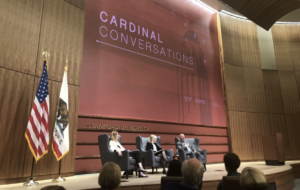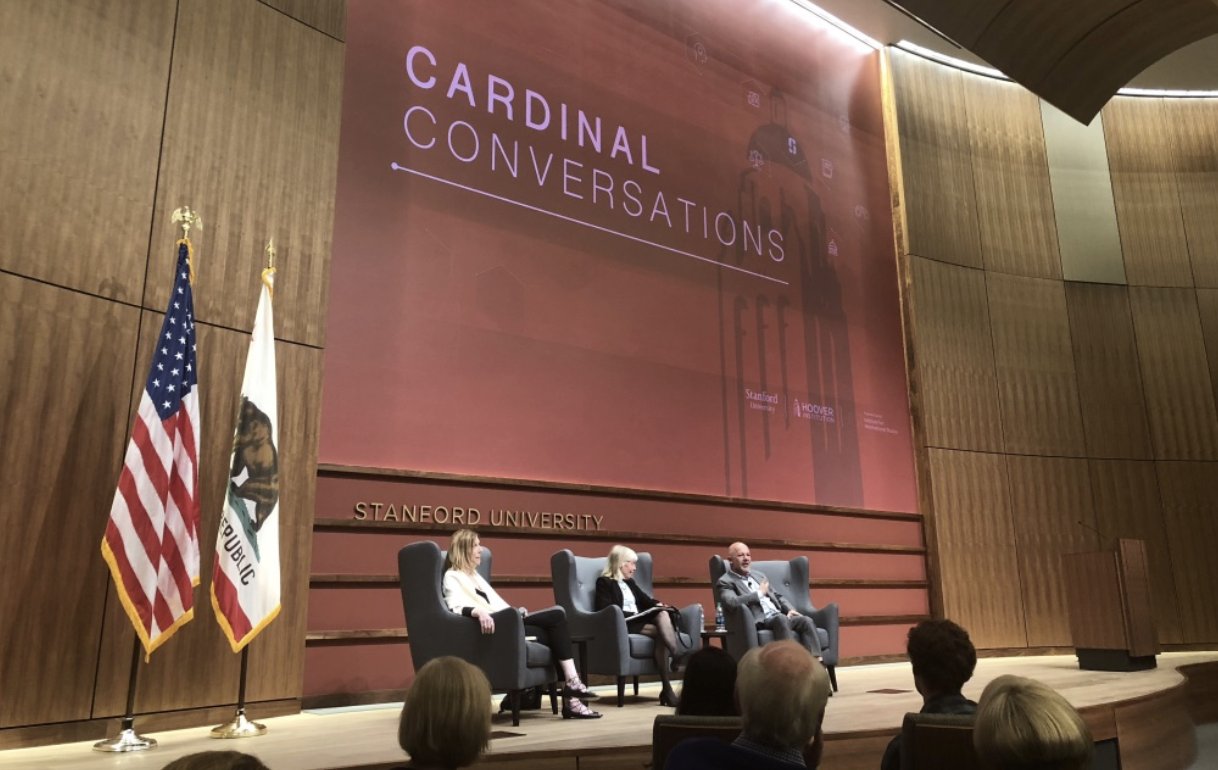Cardinal Conversations hosted Christina Sommers and Andrew Sullivan in their most recent event, “Sexuality and Politics,” in the Hauck Auditorium yesterday evening. Moderated by Deborah Rhode, the event probed the success of Trump’s presidential campaign, criticisms of contemporary feminism and flaws in the #MeToo movement against sexual assault.
Kathryn Stoner, deputy director of the Freeman Spogli Institute for International Studies, introduced Sommers, a scholar at the conservative think tank the American Enterprise Institute, and Sullivan, a conservative political commentator at publications ranging from The Daily Beast to The Atlantic, explaining the Cardinal Conversations mission to provoke thoughtful discussion across the political spectrum.

Rhode opened the debate by asking Sullivan to expound on his views on the Donald Trump’s presidency and the United States’ current political climate.
“I’m generally not at all optimistic about this,” Sullivan said. “What you have is someone who has been brilliantly able to capture a moment of discontent in the country and the world… who has nonetheless cemented a cult-like following within what used to be the Republican party. We are watching the norms of the democratic society be eroded.”
Rhode probed the panelists to explore the reasons why President Trump has garnered support among certain demographics, such as white women and the religious right.
Sommers agreed that Trump has gained support among religious groups such as evangelical Christians in spite of actions that are often seem incompatible with their teachings, citing an article she read investigating evangelical leaders supporting Trump, in which a minister described Trump’s transgressions as “the way of President Trump seeking God.”
According to Sullivan, Trump has tapped into legitimate concerns for many American citizens that have been dismissed in elite circles. Sullivan argued that technology-induced job displacement and massive demographic changes caused by rising levels of immigration are common concerns that have gone unaddressed by both political parties. Sullivan said that Trump has capitalized on these issues despite being unable to directly address them.
Sommers added that Trump garnered strong support among white female voters because they shared similar views on abortion, immigration and economic policies. She added that Hillary Clinton’s campaign incorrectly assumed she would automatically capture a majority of the women’s vote, and that the Democratic party may have also alienated some of their voter base by focusing on identity politics.
“If the demographic party gets too carried identity politics, then they will alienate people. Voters will probably just stay away,” she said.
The discussion shifted to gender issues when Rhode asked the speakers about their views on feminism and the #MeToo moment. Both speakers have been vocal critics of contemporary feminism in the media.
Sullivan said that the view held by many modern day feminists that gender is a social construction has been exaggerated.
“I really do think of myself as a feminist,” Sullivan said. “I regard women as my complete equals. I don’t see any distinction in the capacity to do almost anything in society, but I do think that one of the wonders of the world is that men and women are different animals, and that’s a function of millions of years of natural selection and this has created different ways of being human. I think there’s a spectrum, but I think it’s bimodal. There are a few outliers, but I think the rule is the rule.”
Sommers disputed the idea that a patriarchy exists in the United States. She said that “gender feminism,” as opposed to “equity feminism,” which she defined as advocating for fair treatment, dignity and liberty for women, has evolved into a “postmodern Marxist view that replaced class with gender.”
According to Sommers, statistics frequently quoted by gender feminists are often exaggerated and inaccurate. She argued that the “77 cents to the dollar” claim has been debunked by economists, and that statistics on the prevalence of rape have been grossly exaggerated. According to Sommers, underrepresentation of dissenting viewpoints in gender studies leads to radical views.
“I’ve always wanted to introduce some common sense into feminism,” Sommers said. “I believe that women and everyone will be helped by truth.”
Rhode countered, saying Sommers’ claims of one-sided teaching didn’t match Rhode’s experiences with the Feminist, Gender and Sexuality Studies department at Stanford, where she said different points of views are explored. Further. Rhode responded to Sommers’ view on contemporary feminism with statistics that contradicted Sommers’ claims.
“By pretty much every objective measure of wealth, power and status, American women are underrepresented at the top and overrepresented at the bottom,” Rhode said. “For example, women are a majority of the electorate but hold less than a fifth of congressional seats which has remained unchanged in recent elections. The number of women governors is 10 to 12 percent. We rank 95th among the world in women’s representation in politics.”
The discussion on feminism more broadly soon shifted to the #MeToo movement. Both speakers had mixed feelings about the movement, acknowledging the movement’s effectiveness of highlighting abuses in the workplace but commenting on perceived flaws.
“I find it unbelievable that men would use their power in the workforce to force and somehow coerce women into sex,” said Sullivan. “I find it horrifying. Insofar as this movement has elevated that issue, I am in favour of it. I do however think there should be some distinctions between a clumsy past. People should have some due process in this and I think part of it is driven by the notion that men are inherently somehow bad.”
For Sommers, the movement was an important step in addressing problems faced by women in the workplace.
“For quite a while, I thought that this could bring women and men across the political spectrum together,” Sommers said. “Conservative women cared about it just as much as liberal women, and most men were horrified.”
Sommers also said, however, that in some instances unwarranted and exaggerated claims negatively affect men accused, such as “grayzone” accusations against comedian Aziz Ansari. She also said that the fear of harassment allegations may create a divisive environment in professional spaces.
“We have to be careful of accusing someone of that crime, because it puts a mark on you for life as an untouchable,” she said.
Audience member Michelle Margolis, recent San Francisco State graduate, said that while she did not like the panel’s focus on Trump, the panelists’ criticisms of modern day feminism resonated with her.
“I’m tired of hearing about Trump,” she said. “I really want to move forward and to figure out what we need to do to fix things.”
Contact Ruth-Ann Armstrong at ruthanna ‘at’ stanford.edu.
